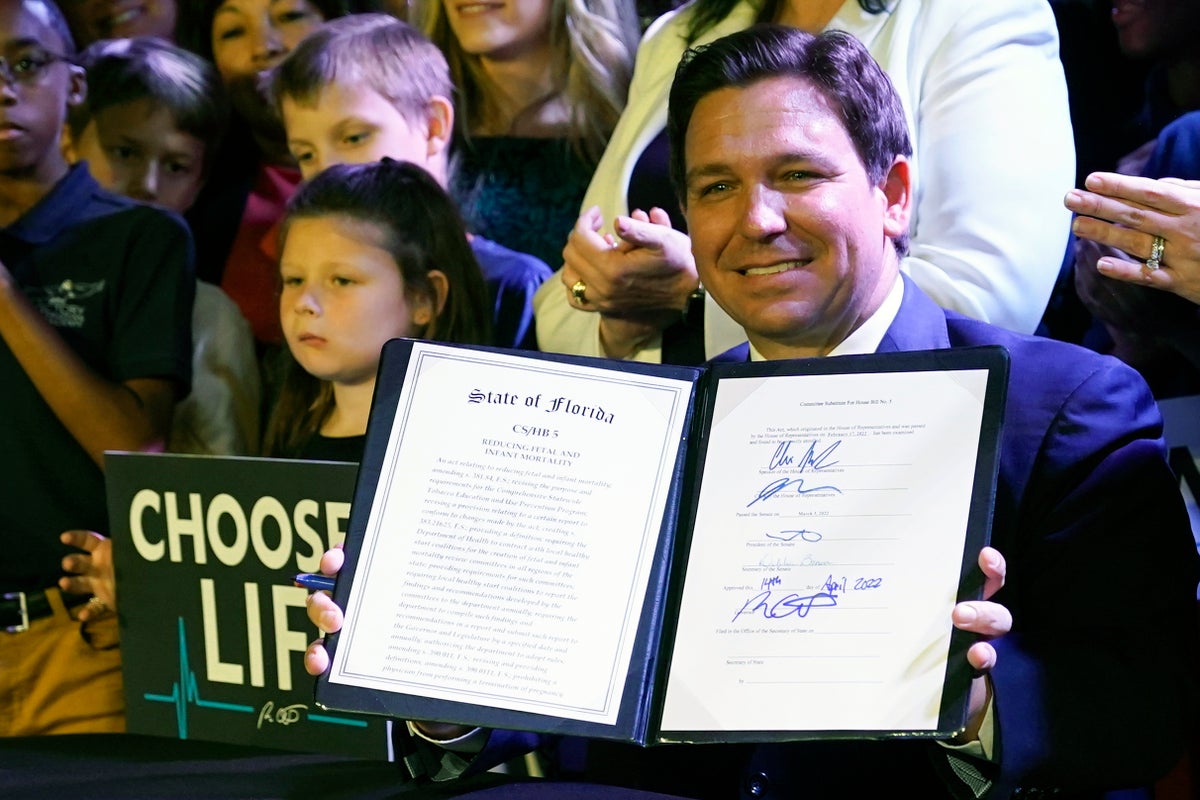
A Florida judge has moved to temporarily block a state law banning abortions after 15 weeks of pregnancy, a day before the law was scheduled to take effect, following a legal challenge arguing that the law approved by Republican Governor Ron DeSantis earlier this year “blatantly” violates the state’s constitution.
The temporary injunction to be issued by Leon County Circuit Court Judge John Cooper follows a US Supreme Court decision to strike down the constitutional right to an abortion, sending the decision whether to protection abortion access back to individual states.
It is among a wave of state-level court orders to freeze anti-abortion laws and so-called “trigger” laws that outlaw nearly all abortion care, measures that are set to take effect in more than a dozen states following the Supreme Court’s sweeping decision.
Governor DeSantis’s administration will appeal the decision.
Despite 20 years of attempts from the state’s Republican-led legislature to dismantle abortion rights in the state, access to care has been repeatedly upheld in the court – and by Florida voters, which approved a state constitutional amendment in 1980 for broad protections for privacy rights, including abortion, according to abortion rights advocates.
Within the week after the Supreme Court’s decision on 24 June in Dobbs v Jackson Women Health Organization, which overturned the half-century-old landmark precedent in Roe v Wade and its affirming ruling in 1992’s Planned Parenthood v Casey, judges in Kentucky, Louisiana, Texas and Utah have also temporarily blocked “trigger” laws and other restrictive abortion laws as lawsuits from abortion rights advocates and providers play out in state courts.
Lawsuits have been filed in Idaho and Mississippi seeking similar relief.
Florida’s law mirrors the Mississippi law banning abortions at 15 weeks of pregnancy that was at the centre of the US Supreme Court case, which upheld Mississippi’s ban.
A decision to block Florida’s law could have sweeping implications for abortion access across the South, where Florida’s neighbouring states are trying to enact anti-abortion laws that could force patients to travel to states as far as Illinois, North Carolina or New Mexico – the closest states with legal care – if legal challenges are not able to strike down restrictive laws.
Florida’s challenge is likely to end up at the state Supreme Court, which Governor DeSantis has helped reshape. All seven of its judges are Republican appointees.
“While Floridians may soon be able to breathe a sigh of relief, make no mistake, abortion access is in real peril in our state,” said Kelly Flynn, president and CEO of A Woman’s Choice Clinics, a provider in a state.
“Already, lawmakers have made it incredibly difficult for our patients to access the essential health care they need and for us to provide that care,” she said in a statement. “There has been chaos and confusion among patients since the Supreme Court overturned Roe v Wade. We cannot let Florida turn the clock back. Our patients shouldn’t have to worry if and when they can access abortion care, and we will continue to fight to protect their health and lives.”
A spokesperson for Governor DeSantis said in the statement that the administration believes the law will “ultimately withstand all legal challenges.”







